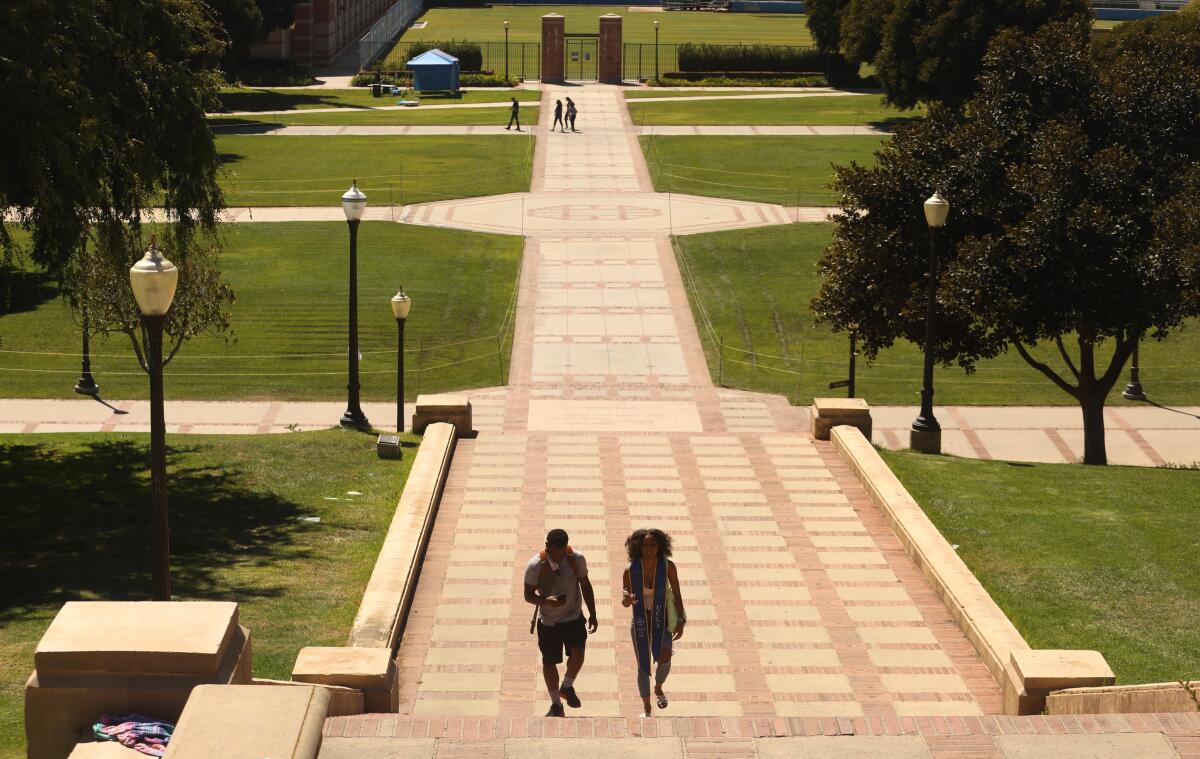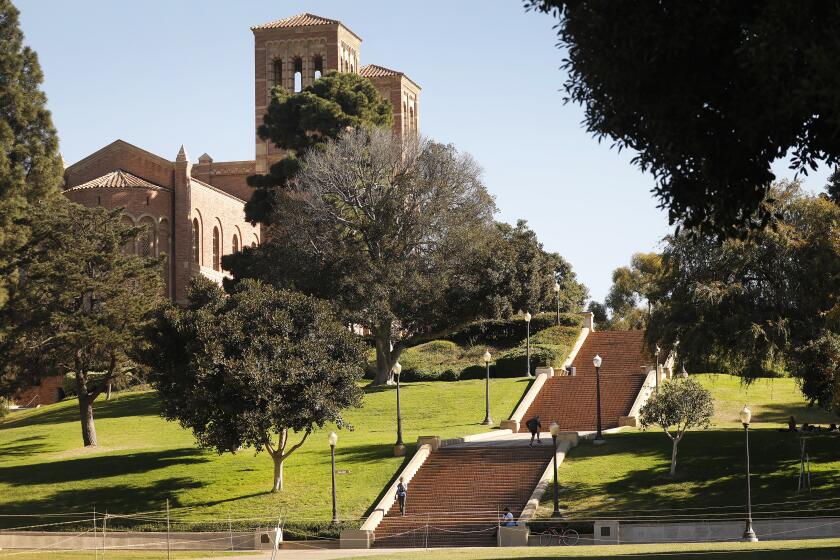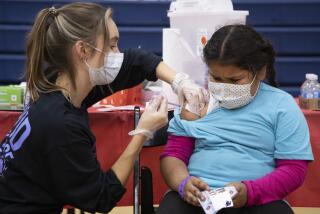Give California’s college students vaccine priority. Without it, fall campus life is in danger

- Share via
In Los Angeles, you can once again dine outdoors at a restaurant. Stores are open and freeways are buzzing. Construction sites are crowded on weekdays as are the beaches on sunny weekends. But our region’s dozens of university campuses remain closed with plans for remote education at least through summer — and continued uncertainty about the shape of fall.
Nearly all university teaching throughout Southern California has been conducted remotely since March. This decision has promoted the safety of students, faculty, staff and the broader L.A. community, but it also comes at a cost. As we look ahead, the fall semester and higher education remain in jeopardy, despite the arrival of the COVID-19 vaccine.
Faculty, staff and students need to be given access to the vaccine sooner rather than later so that a full university life can resume in the fall. We aren’t arguing that students should be at the front of the vaccine line. They should stand behind the elderly, at-risk front-line workers and those at elevated health risk. We wouldn’t put college students ahead of K-12 teachers either, because the need to get younger children back in traditional school — and their parents back to work — is critical to the future of education, our economy and our collective well-being.
The Zoom-based university can offer excellent classroom instruction, but universities at their best are high-density spaces where students and faculty interact inside and outside classrooms, laboratories, dorms and practice rooms. The ultra-low-density university cannot be the hub of intellectual intensity, the powerful collective place of invention and inquiry, nor fully inhabit its proven role as an engine of educational and economic activity.
The costs and limitations of remote education are even more dramatic for those from underrepresented communities and those with fewer economic resources. The pandemic has made the digital divide all too clear. Many students lack reliable Wi-Fi or a quiet space to access courses, leading them to disengage or even contemplate withdrawing. Mental health challenges among college students studying remotely have risen dramatically. And while applications to flagship universities have increased, fewer minority students and low-income students are applying to college overall.
Another term of remote education will exacerbate these disturbing trends.
Of course, what our country needs most is to have enough of our adult population vaccinated as quickly as possible to reach herd immunity. Ideally, we should not be forced into these painful comparisons and trade-offs. But given the bumpy rollout of the vaccine and accompanying supply challenges, a return to a fully flourishing college experience is at risk unless we can commit to vaccinate students before the start of the 2021-22 school year.
In Los Angeles County, universities have faced exceptionally severe restrictions under the county’s public health rules. While nail salons have limited indoor service, faculty are prohibited even from meeting with students on campus, even outdoors, one-on-one, masked and distanced. Music and dance students can’t practice, even alone in a campus studio. Most science classes can’t use laboratories, and all discussion-based classes and lectures have been taking place online. Our libraries remain closed to students and faculty even as public libraries allow limited access to visitors.
Many states, including California, have recognized that the education sector, including higher education, needs to be given some vaccine priority. But at the university level, with our intertwined living and learning environments, students must also be part of the vaccine equation by summer.
Yes, the vast majority of our students are in the 18-to-30 age range, a group at lower risk of having severe or fatal cases of COVID-19. So it might be easy to think they belong at the very back of the vaccine line.
But what may make good sense at the individual level can have dire consequences in aggregate. Residential universities operate, by their nature, with people in tight quarters and in close contact.
And even if case rates decline considerably in the community, without comprehensive student access to the vaccine, we would likely need to continue robust physical distancing, which means a classroom that usually holds 90 fits only 22. Dormitories could likely operate at only a fraction of normal capacity; at UCLA, occupancy in some dorms is just 5%.
The University of California plans to bring students back to its 10 campuses for mostly in-person classes beginning in fall 2021.
We recognize the many uncertainties around the vaccine, including whether the vaccinated can still spread infection to others and how much protection it will provide against new coronavirus variants. Even with the vaccine, masking and some degree of distancing might well be necessary depending on the pandemic’s trajectory. But without vaccine access for students, it is difficult to see a plausible path back to the animated, fully immersive residential college experience.
Another remote or hybrid fall session, especially after 18 months of severe disruption of education, will have enormous costs for our students and our state. At UCLA alone, the estimated COVID-19 related economic losses through the end of 2020 (excluding the health system) topped $400 million.
Independent from the fiscal costs, another remote fall would represent a colossal collective societal failure to recognize in-person college as a transformative experience.
Unless we commit to give college students vaccine access before fall terms begin, many will have to continue their educations in their childhood bedrooms, at local coffee shops and who knows where else. Some will opt out of college, perhaps forever. Without timely, more complete vaccination, higher education will remain a shadow of itself.
Jennifer Mnookin is dean of the UCLA School of Law and Eileen Strempel is inaugural dean of the UCLA Herb Alpert School of Music.
More to Read
A cure for the common opinion
Get thought-provoking perspectives with our weekly newsletter.
You may occasionally receive promotional content from the Los Angeles Times.










